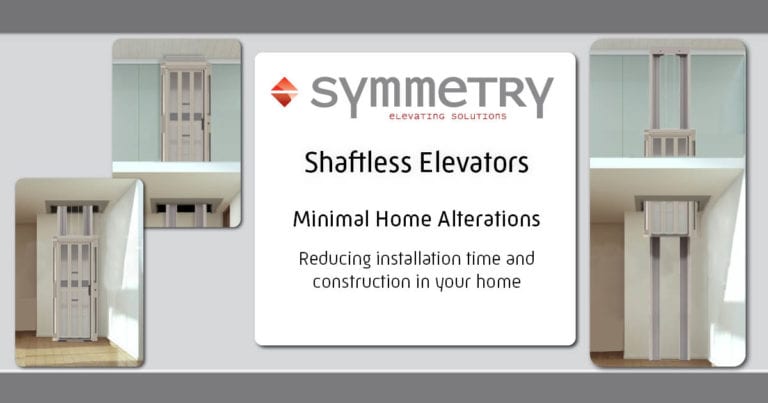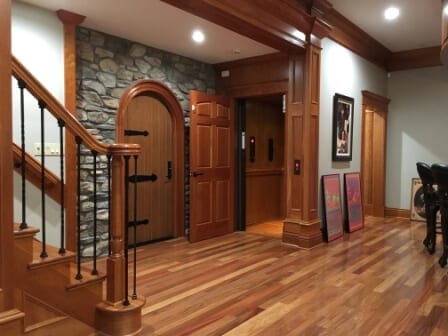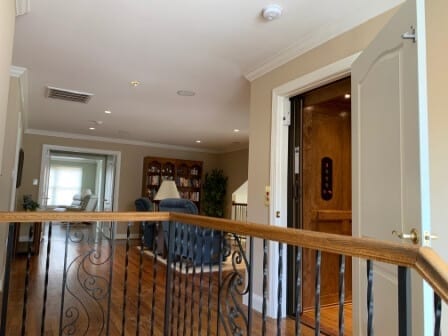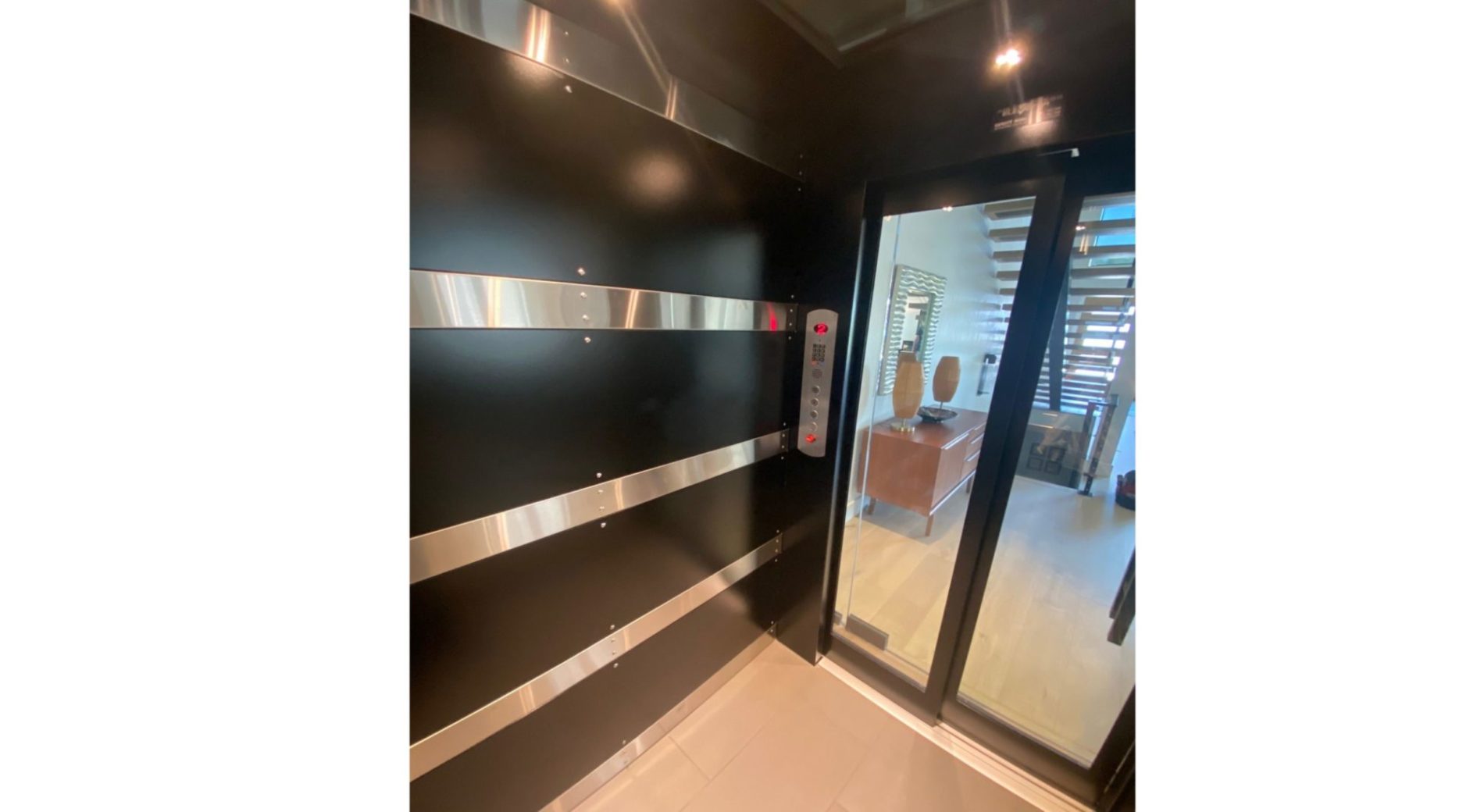Choosing a residential elevator is a big decision and one that requires you to consider everything from where you want the elevator installed to the color of the trim in the elevator car. The industry introduces new innovations and exciting design choices regularly so it’s important to have the latest information.
If you’re in the market to buy a home elevator but unsure where to begin, here are seven factors to consider, from the types of elevator available to what to look for in a home elevator company.
1. What Type of Elevator Do You Want?
Residential elevators come in a range of models, each with its own benefits. Whether you’re looking for an elevator to help you age in place or as a centerpiece to your home decor, you’ll have multiple models to choose from. Your choice will be determined in part by how much space you can spare for elevator installation, energy use, number of levels serviced, and customizable options. Popular residential elevator models include:
Shaftless Home Elevators
Among the smallest available elevators, shaftless elevators are designed for travel between two levels only. They require minimal home alterations during installation, can be incorporated into open floor plans, and take up less space than other models. Shaftless elevators are also among the most affordable custom home elevators on the market.

Inline Gear Drive Elevators
Inline gear drive elevators are another option for small homes, as they do not require a machine room for operation. A typical inline gear drive elevator has a rated capacity of 1,000 pounds, can serve two to six stops, and can run at speeds of forty feet per minute.
Hydraulic Drive Residential Elevators
If you want the quietest ride possible, consider a hydraulic home elevator. A hydraulic elevator system raises and lowers the elevator car by filling and releasing fluid from an airtight cylinder. Hydraulic residential elevators may also serve two to six stops, and can carry a maximum load of 1,400 pounds (with variance).
Winding Drum Drive Elevators
Winding drum elevators are one of the oldest types of custom home elevators and with reason. This model of elevator is known for its reliability. Heavy cables attached to a rotating drum and variable speed motor move the elevator up and down. Capable of serving up to six stops, winding drum elevators offer smooth stops and starts, and have benefited from years of innovation, research, and technological advances.
Pitless Elevators
Using the inline gear or winding drum drive, the pitless elevator may be used when the existing site conditions do not allow for a pit in the hoistway. The pitless elevator is only available for front opening cars, so if you need a straight-through or 90-degree opening, you will have to go with a different home elevator option.

2. Location and Elevator Entry/Exit Configurations
Don’t buy a home elevator until you’re sure where it will be installed. Depending on the make and model, you may want the elevator to stand out or blend with its surroundings. Also depending on the model, you may need room to install an elevator pit and machine room.
To ensure you get the right elevator for your needs, verify that the brand and model you’re considering has the type of entry and exit configurations you need. Bear in mind that sometimes the best location for your elevator isn’t where you think it will be, so listen to the advice of the home elevator company you’re using.
3. Future-Proof Your Elevator
Considering your needs right now is important, but so is considering what you’ll need ten or twenty years from now. You might be able to get by with a smaller car size right now, for instance, but what if your partner develops mobility issues in the future? Buy the right-sized elevator for your future aging-in-place needs to get the most use and convenience out of it.
4. Custom Home Elevator Safety Features
 Residential home elevators are very safe systems, in part because designers have included important safety features should problems arise. While each elevator model has its own safety features list, the following are essential:
Residential home elevators are very safe systems, in part because designers have included important safety features should problems arise. While each elevator model has its own safety features list, the following are essential:
- Interior emergency lighting
- Emergency stop and alarm buttons
- Battery backups to raise or lower elevator cars in the event of power failures
- On-board telephones to call for assistance if needed (be sure to have the number of your home elevator company programmed into the phone or listed nearby)
- Sensors that bring the elevator to a safe stop if obstructions are detected
- Car door locking devices
- Handrails for extra stability
- Flip-up seats to keep you comfortable during travel if needed
5. Capacity Weight Rating
Don’t underestimate the load capacity of your elevator: When you buy a home elevator, it’s wise to choose one with a weight capability above what you think you’ll need. The average residential elevator has a weight capacity between 400 to 1,000 pounds, but hydraulic elevator models can carry up to 1,400 pounds (with variance).
6. Warranty Considerations
No matter what type of home elevator you buy, be sure to check the specifics of the system’s warranty. Most residential elevators have a standard two-year parts warranty. The contractor you choose should provide you with a warranty for labor: most contractors offer one-year labor warranties. In addition, look for elevators that offer at least two-year warranties on batteries and three-year warranties on drive trains. You may also talk to your local elevator company to see if there is a possibility for extended warranties.

7. Home Elevator Companies
Finally, take the time to do some research on the home elevator company you plan to use. Visit the company’s website, read customer reviews and testimonials, and check the company’s standing with organizations like the Better Business Bureau. You’re making a large investment when you buy a home elevator, so be sure you trust both the home elevator company and its associated installation contractors.
Keep these seven factors in mind as you move forward with your custom home elevator purchase, and you’ll find it easier to choose the home elevator that’s right for you, with the technical specifications and customized choices you need to enjoy your new elevator for years to come.

